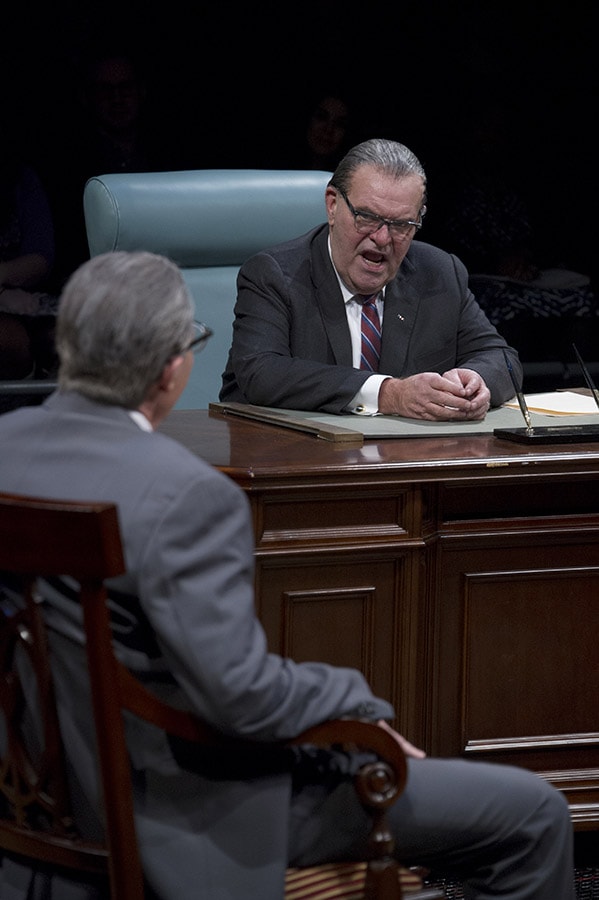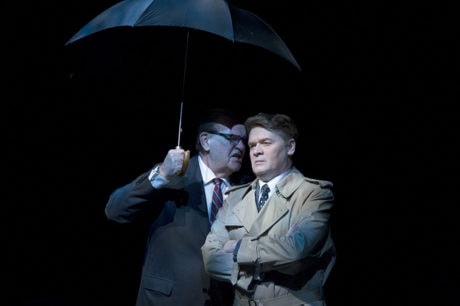Lyndon Johnson’s 1964 margin of victory – nearly 16 million popular votes and a lopsided total of 486 electoral votes – is almost unimaginable today. Armed as well with a 68-32 majority in the Senate, and a House dominated by Democrats, 295-140, his lofty legislative goals seemed well within reach. How, then, did LBJ’s support dissolve so radically? How was it possible, less than four years later, that he’d lost the power and the will to seek another term?

Johnson’s excruciating descent from triumph to tragedy forms the dramatic core of Robert Schenkkan’s The Great Society. It follows the playwright’s award-winning tale of Johnson’s first term, All the Way. Arena’s energetic new production, well-directed by Kyle Donnelly, was recently slimmed down by Schenkkan from three acts to two. It is structured primarily as a series of short, dramatic Oval Office confrontations between Johnson and his closest frenemies Bobby Kennedy, Martin Luther King, Robert McNamara, and J. Edgar Hoover. Congressional giants Sen. Everett Dirksen (R-IL), Rep. Wilbur Mills (D-AR), Chicago Mayor Richard Daley, Governor George Wallace of Alabama, and Johnson’s successor Richard Nixon are also featured. Each in his own way represents an important threat to Johnson’s Great Society. Each shares responsibility for the tragic splintering of American politics that gnawed away at Johnson’s vision.
The trouble begins almost immediately, just after the President’s stirring 1965 State of the Union address. “The Great Society,” he tells us, “rests on abundance and liberty for all. It demands an end to poverty and racial injustice.” Education, health insurance, and voting rights are key components. Dirksen soon accuses Johnson of “running for Santa Claus” and Mills, chairman of the House Ways and Means Committee, reminds Johnson that he holds the purse strings.
The White House meetings are punctuated by brief but evocative scenes representing the real-life consequences of Johnson’s failures to keep destructive forces in check. Racial violence erupts in Selma, Chicago, and Los Angeles. Students protesting the Vietnam War descend on Washington, and casualties in Vietnam climb steadily on digital displays surrounding the Fichandler stage.
Vietnam creeps up quietly at first—Johnson views the conflict as a gnat-size problem and treats McNamara’s briefings as pesky intrusions into his gigantic domestic agenda. Almost unblinkingly, he agrees to throw more men and materiel into the fight, until the war demands his full attention, a $10 billion budget, and over half a million troops. Eventually, the conflagration and its enormous human toll saps funds from his domestic programs and costs him King’s support. Johnson’s lying about the escalation creates an unbridgeable “credibility gap.”
Jack Willis as LBJ lacks the president’s trademark grandiosity and swagger, but he communicates both uncanny political acumen and ultimately a true sense of bewilderment, sadness, and regret as the tide turns against him. His few brief scenes with Lady Bird, a character sharply etched by Susan Rome, allow a glimpse of his kinder side. Yet the play mostly favors fast-paced chronology over psychological depth. Many characters are broadly sketched, and some, like Hoover, Dirksen, Mills, Humphrey, and Nixon, are particularly waxen.

Others are given enough room to provide insight into their motivations. John Scherer as Bobby Kennedy balances intense idealism with naked ambition. He warns Johnson that government funds are being siphoned off to pay cronies like Daley’s ward bosses and not reaching the people who need it most. The legendary distrust between Kennedy and Johnson is well-portrayed.
Bowman Wright as Dr. Martin Luther King burns with passion for racial justice. He pressures Johnson to move the Voting Rights Act along full speed even as he struggles to keep his own minions, most notably JaBen Early as Stokely Carmichael, from descending into deadly confrontation. Dr. King’s heart-rending strategy sessions with his most trusted advisors, whose anger overwhelms his non-violent approach, and with the President, are the most effective interactions in the play.
After highlighting LBJ’s tense relationships with both Kennedy and King, the playwright relegates their assassinations to mere mentions during Johnson’s meeting with President-Elect Nixon in late 1968. We have no sense of how these senseless killings affected LBJ.
In a talk-heavy drama, with several of its most pivotal lines well-known to senior members of the audience, some bits of dialogue were lost as characters turned away from portions of the audience. Yet Donnelly kept her characters moving smartly, and set designer Kate Edmund’s staging was arresting. The actors’ deft manipulation of key props, including Johnson’s massive desk and the lectern from which he informed and lied to the American public, hit the mark. The stage floor, as well, literally burned with symbolism. Emblazoned with the Great Seal, it nonetheless erupted at times with flames of racial bigotry and violence that Johnson’s power could not extinguish.
The Great Society entreats us to remember that despite the tragic Vietnam War, Johnson achieved very real gains in domestic policy, from Medicare and Medicaid to the Voting Rights Act and the establishment of our National Endowment for the Arts and the National Endowment for the Humanities. They remain embedded in the fabric of our national life, even as we witness recent efforts to eviscerate them.
Arena’s well-crafted production reminds us of Johnson’s attempts to face the problems of poverty and racial injustice at home, while struggling to assert our place in the world – challenges that bedevil us still.
Running Time: Two hours and 30 minutes, with one intermission.
The Great Society plays through March 11, 2018, at Arena Stage – 1101 Sixth Street, SW, in Washington, DC. For tickets, call (202) 488-3300 or purchase them online.





I would say that the production is better that this review may indicate . I felt the collapse of Johnson as a man , and felt the show captured him as a tragic figure in a Shakespearean sense. It takes great acting to carry such a show and I felt all parties delivered. This is by far the best show of the season at Arena, unless we include the reprisal of the Originalist, which is maybe even more brilliant . Great show!